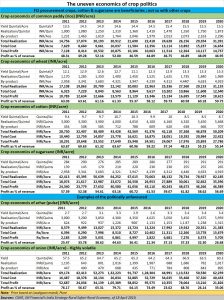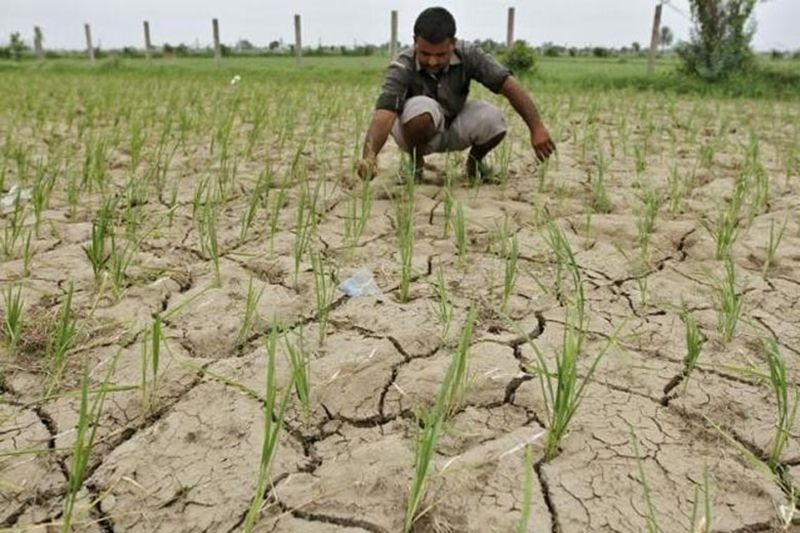https://www.firstpost.com/business/govt-plans-to-incentivise-contract-farming-centre-should-encourage-large-firms-to-be-part-of-plan-decision-will-bring-transparency-of-purchases-and-sales-6910021.html
Why contract farming matters – I
Contract farming offers farmers tremendous security, but all’s not well here
RN Bhaskar — July 1, 2019
The government has just announced that it will look at ways to incentivize contract farming. While the details of the incentives extended to contract farming will only be known after the forthcoming Union Budget papers are tabled, it is important to first understand why contract farming is important, and also to know more about some players that have already achieved tremendous success in this area (http://www.asiaconverge.com/2018/06/madhya-pradesh-needs-to-go-beyond-msp-and-procurement/).
At one level, contract farming is like any other contract to purchase goods of a quality and quantity within a specified time period. In agriculture, however, contract farming assumes a totally different dimension because of the political hues which have prevented it from blossoming the way it should have. As a result, farm incomes have remained pathetically low (http://www.asiaconverge.com/2018/08/rural-incomes-worse-previously-imagined/)
There are three factors that have impeded contract farming:
First, several states passed laws banning contract farming. As always, the arguments that have been put forth for banning contract farming appear to be to protect farmer interests. The idea is to ensure that big corporate players would not dictate prices to farmers. But like all laws that seek to protect, these laws also end up smothering the very people that they are meant to protect. The ban on contract farming prevented farmers from discovering a fair market price. In many states, farmers have been left to the mercy of an even more rapacious structure – government appointed agencies that pay farmers a lot less than they should have got, except where political interests have backed the crop that is being farmed.
Second, the poor state of adjudication. In most contracts, the defaulting party has to pay a penalty for breach of contract. In the case of farming, most farmers insisted on being paid the contracted price in case market prices were lower than the contracted rate. But if market prices were higher, farmers defaulted. Politicians would not allow private entities to take farmers to court, and would allow such cases to drag on. Thus the purchasing party – usually a corporate linked to agro produce procurement – was invariably the loser.
Third, the government created agencies like the Food Corporation of India (FCI) which ensured that only growers of rice and wheat benefitted. This too was done in the name of food security. But as we shall see later, the motives were to make a profit at the cost of both taxpayers and marginal farmers. Eventually, the country, and the entire farming sector, paid the price.
To understand Indian agriculture, it is essentially to appreciate the political support some crops have enjoyed, as a result, well connected farmers have always benefitted from higher rates of profit and income than growers of ‘unprotected’ crops.
 Take a look at the table alongside (the full version of the data with details of expenses can be downloaded from http://www.asiaconverge.com/wp-content/uploads/2019/06/2019-06-29_FP-returns-unabridged-select-crops.jpg). There are two parts to the table. The first part is about crops that are protected by the government or by powerful political interests. The second part of the table are examples of two crops that are not protected by government; and the kind of distress they are exposed to. The table itself has been sourced from a paper by JM Financial titled India Strategy-Rural Safari-Rural-Economy, of 18 April 2019.
Take a look at the table alongside (the full version of the data with details of expenses can be downloaded from http://www.asiaconverge.com/wp-content/uploads/2019/06/2019-06-29_FP-returns-unabridged-select-crops.jpg). There are two parts to the table. The first part is about crops that are protected by the government or by powerful political interests. The second part of the table are examples of two crops that are not protected by government; and the kind of distress they are exposed to. The table itself has been sourced from a paper by JM Financial titled India Strategy-Rural Safari-Rural-Economy, of 18 April 2019.
Look at the row showing profit as a percentage of revenue. Paddy farmers get a profit which is 45% or more of the total market price of their produce. This is after accounting for all expenses – labour costs involved in using humans, animals or machines, pesticides, fertilisers, water, electricity, working capital and other miscellaneous costs. Revenues include sale of the main produce and also by products (for example chaff is a by product).
Crops which do not enjoy political patronage – the chart gives the instances of pulses (http://www.asiaconverge.com/2017/05/how-pulses-imports-drove-domestic-growers-to-the-ground/)and onions (http://www.asiaconverge.com/2018/12/empower-farmers-through-the-kurien-or-wdra-models/) — often cause farmers distress, as the government neither agrees to procure them from farmers, nor agrees to create an NDDB like structure for ensuring offtake from farmers at fair prices. NDDB, it must be noted, does not allow any direct import of milk into the markets and thus cause prices to get depressed (http://www.asiaconverge.com/2017/02/nddb-and-dairy-farming-in-india/). Quite possibly, the recently promoted FPOs (farmer producer organisations) will be allowed to take up this role.
When it comes to wheat, the margins are even higher – at over 58% of revenues on an average. For cotton too it is over 55%, and so is the case with sugarcane as well. These are the crops that benefit from political patronage. Rice and wheat remain the only crops which the government actually procures – through the Food Corporation of India or FCI — from farmers. Unfortunately, the FCI has limits on how much quantity it can purchase. Hence, it purchases from farmers who are well connected, and often ignores the small and marginal farmers who are compelled to sell the rice and wheat at distress prices. That is something that the figures don’t quite reveal.
Moreover, FC I ends up procuring almost 140 million tonnes of grain (http://www.asiaconverge.com/2018/08/farming-politicians-pricing/) even while the storage capacity in the country is only around 90 million (latest figures available). That causes several million tonnes of grain to get damaged in the rain and sun and through pests. It may be recalled how the Supreme Court has urged the government to give away to the poor, free of cost, all grain which cannot be stored well. That is something the government is unwilling to do. This compels one to believe that the FCI does not want people to know that it has paid first-rate prices for second grade grain, and now wants to allow the evidence of this fraud to be destroyed through non-storage. This must stop, because it is another major form of corruption which must be subsidised through taxpayers money.
Finally, the FCI does not address the distress that small farmers face, bedcause the FCI did not procure the grain that they had produced.
That is why the government must move out of procurement altogether. The government has another wonderful law which it can implement called the WDRA or the Warehousing Development Regulation Act (http://www.asiaconverge.com/2017/08/is-wdra-a-functioning-organisation/). The government can authorize WDRA registered warehouses to procure the grain along guidelines issued by the ministry. The FCI can procure the grain from WDRA warehouses instead, because these warehouses have in place better audit and assaying of quantity and quality of grain than the FCI has.
At the same time, incentivize large companies like ITC to go in for conract farming agreements with farmers for the grain which they then sell as flour and other value-added products. This way, the government cannot announce a procurement price that is higher than the contracted prices, unless it is through the commodity markets and through warehouse procurement.
Contract farming, commodity exchanges and WDRA registered warehouses will bring in transparency of purchases and sales that present government mechanisms do not offer. Such mechanisms also allow for warehouses to store pulses, and other grains (jowar, bajra, corn etc) which are currently ignored by the FCI.
Till such mechanisms are put into place, let contract farming be promoted more aggressively as it is the easiest mechanism to be put into place.
In fact, some companies are already doing amazing work on the contract farming front. And this includes the likes of ITC, Balaji, Pepsi, Jain Irrigation, and Bayer. But more on this later.










































COMMENTS